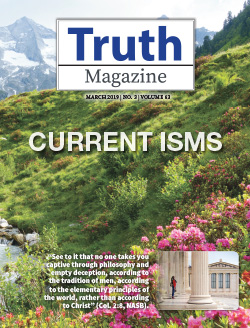We are moving the subscription service for current issues of Truth Magazine to CEI Bookstore/TruthBooks.com. The most recent two (2) years will be secure behind a paywall, and will only be available to paid subscribers. Subscribers will receive a monthly email from MailChimp, announcing that a new issue is available. If you are already a paying customer and have not received a link to download the newest version of Truth Magazine, please contact Mark Mayberry.

MONTHLY COLUMNS
EDITORIAL: Conflicting Worldviews
by Mark Mayberry
MEDITATIONS: The “Memoirs of the Apostles”
by Kyle Pope
WOMEN’S INSIGHTS: Lessons from the Trash Can
by Deborah Towles
DOCTRINE: The Sermon on the Mount: Judgment Without Mercy
by David Flatt
FAMILY: Wayward Children: Priceless Guidance for Broken Hearts
by Ron Halbrook
QUESTIONS AND ANSWERS: How Can We Become Better Servants?
by Bobby L. Graham
ARCHAEOLOGY: The Healing of the Demoniac
by Leon Mauldin
THEME: Current Isms
Article 1: Atheism
by Danny Linden
Article 2: Hedonism
by Phillip Shumake
Article 3: Determinism
by Michael Wallace
Article 4: Environmentalism
by Joe R. Price
Article 5: Sectarianism
by David Halbrook
Article 6: Modern Political Systems
by Kurt G. Jones


